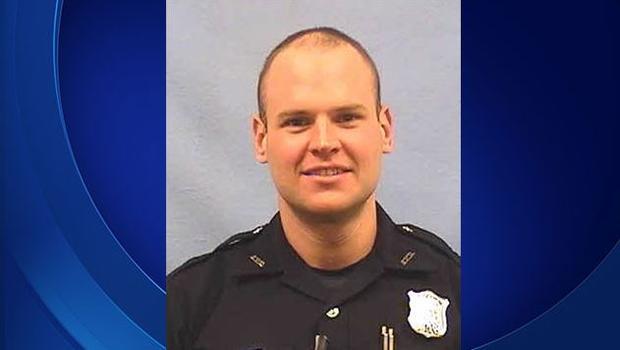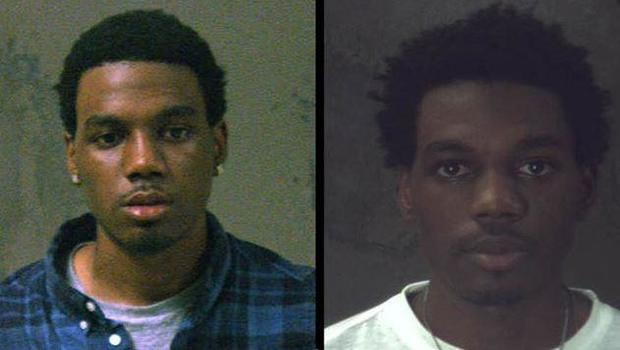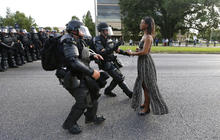
By James Burns. CBS AFFILIATE WRBL
ATLANTA — A grand jury on Wednesday charged a white former Atlanta police officer with felony murder and other crimes in the death of an unarmed black man who was driving a car.
The Fulton County grand jury also indicted James Burns on charges of aggravated assault, making a false statement and two counts of violation of oath of office in the June 22 killing of 22-year-old Deravis Caine Rogers, according to defense attorney Drew Findling. Burns has been out on bond since his arrest.
Prosecutors said Burns fired into Rogers’ vehicle while responding to a call about a suspicious person, even though Burns wasn’t in danger and had no way to identify Rogers as the reported suspicious person.
Findling disputed that, saying after the grand jury hearing that Burns believed that Rogers’ car was accelerating toward him and that his life was in danger.
Atlanta police Chief George Turner fired Burns July 1 after an internal investigation determined Burns used unnecessary and excessive force.

CBS AFFILIATE WRBL VIA DEKALB COUNTY POLICE
Burns responded after an off-duty officer working as a security officer at an Atlanta apartment complex called police to report a suspicious person, prosecutors have said. When Burns arrived, he tried to block a 2011 silver Ford Fusion that was leaving the complex.
The Fusion, driven by Rogers, didn’t try to hit the officer and Burns was standing at the rear of his patrol vehicle, authorities have said. They also said Burns had no information describing Rogers as a threat and no way to identify Rogers as the man the off-duty officer had reported.
But Burns fired one shot into the side of Rogers’ vehicle, hitting Rogers in the head, prosecutors have said.
Findling, however, said Burns got the call, learned a fellow officer was in trouble, raced through traffic to help and arrived to see a car parked against traffic pulling away and refusing to stop, and it all happened within four or five minutes.
“I don’t judge nor should anybody judge Officer Burns on four minutes of his life,” Findling said. He said his client had been an international humanitarian aid worker and then returned home and became a police officer in his 30s to serve the city he loves.
Fulton County District Attorney Paul Howard said Burns acted too quickly to make a decision that resulted in Rogers’ death.
“It became apparent that the officer did not know anything about the person in the car and without knowing any specific facts, he made a decision that ended up being exactly the wrong decision,” Howard said.
Rogers’ mother Melva Rogers last month filed a wrongful death lawsuit against Burns, Turner and the city. Burns violated Rogers’ civil rights by using excessive and deadly force and failing to grant him due process, the lawsuit says.
Melva Rogers thanked supporters and said she was feeling overwhelmed but excited. She added that so far, she feels her son didn’t die in vain.

Protests against police violence
After addressing reporters, Melva Rogers walked toward supporters gathered outside the courthouse with her fist raised in the air as the crowd chanted, “We believe that we will win.”
Community groups and lawyers organized a 24-hour demonstration that started Tuesday evening outside the courthouse to call for an indictment and to remember others who have been killed by law officers in Georgia. A few dozen were outside Wednesday during the grand jury proceeding.
Findling took issue with calls by outside groups and some lawyers for people to rally at the courthouse and send a message to the grand jurors to return an indictment. He said he filed an emergency motion before Wednesday’s hearing asking to delay the grand jury proceeding “due to lack of secrecy of the proceeding and undue influence by outside sources.”
“That’s not the way grand juries work. A grand jury is not supposed to base a decision on what they see in the street. They’re supposed to base a decision on what they see in there,” he said. He said it will be an issue later.
Georgia police officers facing grand juries for use of deadly force have traditionally been allowed to sit in on the proceedings, along with their attorneys, and to make an unchallenged statement at the end. That practice, unique to Georgia, drew criticism amid increasing scrutiny of police use of force nationwide. It says officers can no longer sit in on the entire proceeding.
While they may still make a statement to grand jurors, they now must answer questions from prosecutors and grand jurors if they do.
Because this shooting happened before July 1, the old rules were still in effect. Neither Findling nor Howard would say whether Burns addressed the grand jurors, citing the secrecy of grand jury proceedings.
